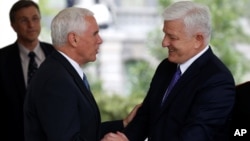The smallest Balkan country, Montenegro, formally became the 29th member of NATO Monday at a ceremony at the State Department, despite fierce objections from Russia.
Montenegro was formerly part of communist Yugoslavia, a stronghold of Moscow. It became an independent republic in 2006 when Montenegrins voted in a referendum to split from Serbia.
U.S. Under Secretary of State for Political Affairs Thomas Shannon congratulated Montenegro for taking NATO's guidance to heart.
“Over decades, the promise of NATO membership and broader Euro-Atlantic integration has advanced our security, our democratic values, and our respect for the rule of law. It has served as an incentive for nations to pursue difficult reforms. This policy has yielded clear results, and that is why NATO allies unanimously agreed to welcome Montenegro into the alliance.”
Big day for a small country
At the ceremony in Washington, Montenegro's Prime Minister Dusko Markovic said this is a very big day for a small country that has endured a lot of sacrifices.
“Nearly a hundred years after it was deleted from the political map of Europe at the end of the World War I, and 11 years since restoration of its independence, Montenegro is again a part of global politics. We are celebrating today the fact that it will never happen again that someone else decides instead of us and our state, behind our back, as it was the case in the past.”
NATO Secretary-General Jens Stoltenberg also was on hand to give a warm welcome to Montenegro as an “equal partner.”
“Montenegro's accession sends a signal to other states that seek membership that if a country truly reforms, if it promotes democracy, strengthens the rule of law, modernizes its armed forces, and contributes to our collective defense, it, too, can join the alliance.”
Shannon sought to reassure NATO allies after President Donald Trump shook the alliance by refusing to state his commitment to the Article 5 collective defense guarantee at last month's summit in Brussels.
“Montenegro's accession sends a strong message of strength to the region and makes clear to our allies that the United States remains as committed as ever to the principle of collective defense as enshrined in Article 5 of the Washington Treaty.”
'Harmless situation'
Trump also made negative headlines in Montenegro and elsewhere for appearing to push Prime Minister Markovic aside at that same summit, to be front and center for a photograph. Markovic himself played down the shove, dismissing it as a “harmless situation.”
The U.S. Senate voted overwhelmingly, 97-2, on March 28 to ratify Montenegro's accession protocol.
Two Republican Senators, Mike Lee of Utah and Rand Paul of Kentucky, were the only ones to vote against it. Paul's efforts to stall the vote infuriated Republican Senator John McCain, who accused Paul of working for Russian President Vladimir Putin.





